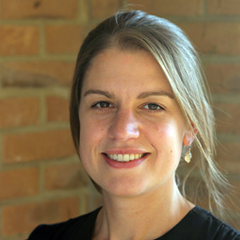Summer School in Bioinformatics (Virtual)
12–16 October 2020
Virtual course
Jointly run with EMBL-EBI
Summary
Owing to the ongoing situation with covid-19, this event will be organised as a virtual course.
This popular computational course, run jointly with EMBL-EBI, provides an introduction to the use of bioinformatics in biological research, giving participants guidance for using bioinformatics in their work whilst also providing hands-on training in tools and resources appropriate to their research.
Participants will initially be introduced to bioinformatics theory and practice, including best practices for undertaking bioinformatics analysis, data management and reproducibility. To enable specific exploration of resources in their particular field of interest, participants will be divided into focused groups to work on a small project set by EMBL-EBI resource and research staff, ending in a presentation from each group on the final day of the course to bring together learnings from all participants.
This course is aimed at individuals working across life sciences who have little or no experience in bioinformatics. Applicants are expected to be at an early stage of using bioinformatics in their research with the need to develop their knowledge and skills further. No previous knowledge of programming is required for this course; group projects may give you the opportunity to learn basic programming, but participants will be supported in this by their mentors. Depending on your chosen project, an introductory programming tutorial may be given as homework prior to attending the course.
The course includes training and mentoring by experts from EMBL-EBI and external institutes.
Learning outcomes
Learning outcomes
Following course completion participants should be able to:
- Discuss applications of bioinformatics in biological research
- Browse, search, and retrieve biological data from public repositories
- Use appropriate bioinformatics tools to explore biological data
- Comprehend ways biological data can be stored, organised and integrated
Programme
The course will start at approximately 10.00 on Monday, 22 June and close at approximately 15.30 on Friday, 26 June 2020.
This is a residential course. All students are requested to stay onsite for the full duration to benefit fully from discussions and interactions with the faculty and other students.
During this course you will learn about:
- Bioinformatics as a science
- Designing bioinformatics studies
- Data management and reproducibility
- Basic tools and resources for bioinformatics
The exact range of resources and tools covered will vary depending on the group project undertaken; there will be no opportunity for you to analyse your own data during this course.
Group projects
A major element of this course is a group project, where participants will be placed in small groups to work together on a challenge set by trainers from EMBL-EBI. This allows people to explore the bioinformatics tools and resources available in their area of interest and apply them to a set problem, providing participants with hands-on experience relevant to their own research. The group work will culminate in a presentation session involving all participants on the final day of the course, giving an opportunity for wider discussion on the benefits and challenges of working with biological data.
Groups are mentored and supported by the trainers who set the initial challenge, but the groups will be responsible for driving their projects forward, with all members expected to take an active role. Groups are pre-organised before the course, and all group members will be sent some short “homework” in preparation for their project work prior to the start of the course.
Basic outlines of the projects on offer this year are given below. In your application you must indicate your first and second choice of project, based on which you think would benefit your research most. Not all projects may be offered, and final decisions on which projects will be run during the course will be made based on the number of applicants per project.
This year’s projects are as follows:
Networks and pathways
This project will make use of gene expression data (RNA-seq) to build protein-protein interaction networks, which can be used to explore functional relationships between the (potentially) expressed protein products. You will use Cytoscape to visualise protein networks, identify key regulators of biological pathways and explore biological function through network analysis, integration and co-visualisation of additional data, and ontology/functional enrichment analysis – helping to build a better view of the wider biological context.
Modelling cell signalling pathways
Curating models of biological processes is an effective training in computational systems biology, where the curators gain an integrative knowledge of biological systems, modelling and bioinformatics. You will learn to encode computational models of signalling pathways from a recent publication using COPASI and how to reproduce the simulation results. Furthermore, you will learn how to annotate models and re-use pre-existing models from open repositories such as BioModels.
Genome variation across human populations
Natural variation between individuals or between different human populations is a result of genome mutations throughout evolutionary history. Some mutations may become fixed because of their beneficial effect while most drift among individuals. During this project, you will investigate genomic variation between two separate human populations of European and Asian descent. Using sequence data from a number of individuals from each population, you will use a range of bioinformatics tools to discover variants that exist between them. In the second section of the project, you will attempt to analyse the functional consequences of the variants you have identified, linking them to phenotypes.
Metabolic network engineering using a systems model-based approach
Metabolic pathway analysis helps to identify the structure and dynamics of a metabolic network and thereby also allow us to have an insight into cell physiology which is the foundation of metabolic engineering. You will work with a curated model related to a metabolism network chosen from BioModels, and learn how to carry out computational analyses to find common patterns in the networks. These might include computing feasible pathways through the network and minimal reactions to knock out specific metabolic functions, along with visualisation and exploration to gain a further insight into the results.
Finding and interpreting publicly available structural data
This project will introduce you to the wealth of publicly available structural data and give you the opportunity to investigate how this data can be used to analyse macromolecular structures. You will firstly explore the search and entry pages at PDBe to identify the type of data available for analysis. Then using this knowledge, you will discover how to access this data programmatically and analyse a subset of your results to interpret biological relevance.
Functional annotation of proteins
Functional annotation refers to discovering the functions of proteins. Participants will annotate a protein of interest which has not been annotated previously, either manually or by any UniProt automatic system. Participants will use different ways to discover the function of their protein of interest from alignment to machine learning. You will learn the different annotation types in UniProtKB and how to use the UniProt resources for their investigation. You will also learn how to build machine learning models, from dataset construction to prediction.
Instructors and speakers
Scientific Programme Committee

Sarah Morgan
EMBL-EBI, UK

Alexandra Holinski
EMBL-EBI, UK

Anna Swan
EMBL-EBI, UK

Lee Larcombe
applied exomics, UK

Hedi Peterson
Tartu University, Estonia
Keynote speakers

Emma Davenport
Wellcome Sanger Institute, UK

Christine Orengo
University College London, UK
Confirmed speakers
Mohamed Alibi – EMBL-EBI, UK
Alex Bateman – EMBL-EBI, UK
Nikiforos Karamanis – EMBL-EBI, UK
Fabio Madeira – EMBL-EBI, UK
Nandana Madhusoodanan – EMBL-EBI, UK
Peter McQuilton – University of Oxford, UK
Conference organiser
Nicole Schatlowski, Scientific Programme Officer
Lucy Criddle, Conference and Event Organiser
How to apply
Prerequisites
No previous knowledge of programming is required for this course; group projects may give you the opportunity to learn basic programming, but participants will be supported in this by their mentors. Depending on your chosen project, an introductory programming tutorial may be given as homework prior to attending the course.
How to Apply
Please complete the online application form. Places are limited and will be awarded on merit. If you have any problems with the online application process, please contact us.
Please note: Applications must be supported by a recommendation from a scientific or clinical sponsor (e.g. supervisor, line manager or head of department). A request for a supporting statement will be sent to your nominated sponsor automatically during the application process. Applicants must ensure that their sponsor provides this supporting statement by the application deadline. Applications without a supporting statement cannot be considered.
Travel visas
Successful applicants will be provided with a support letter for their visa application, if required.
Please visit the following websites for further information on visiting the UK:
Cost
| Cost | Accommodation / meals | |
| Course fee | £680 | This is a residential course and the fee includes all accommodation and meals. |
Bursaries
A limited number of registration bursaries are available to attend this course (up to 50% of the standard registration fee) from Wellcome Genome Campus Scientific Conferences.
The following documents will need to be provided:
- CV
- A justification letter (explain how you will benefit from attending the course)
- A supporting letter from supervisor stating financial need
To apply, please send the above documents to the event organiser by the bursary deadline. Please ensure you have completed the online application before applying for a bursary.
Bursary deadline: 2 March 2020
Additional funding opportunities
Visit our support page for additional financial support currently available.
Extra accommodation
If you wish to book onsite accommodation either side of the course dates, please contact the Conference Centre directly.
Accommodation services phishing scam – please be vigilant. More information.

